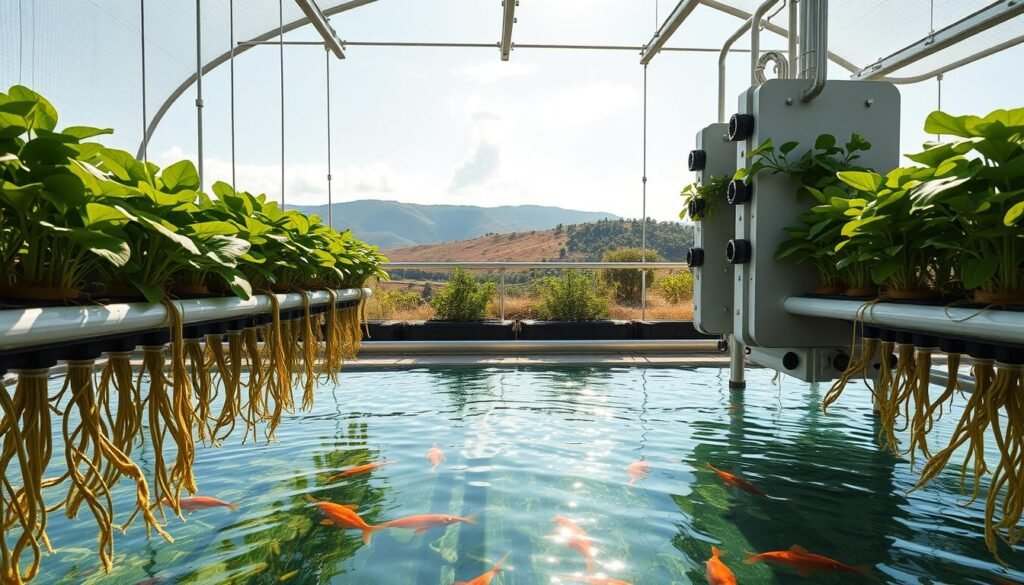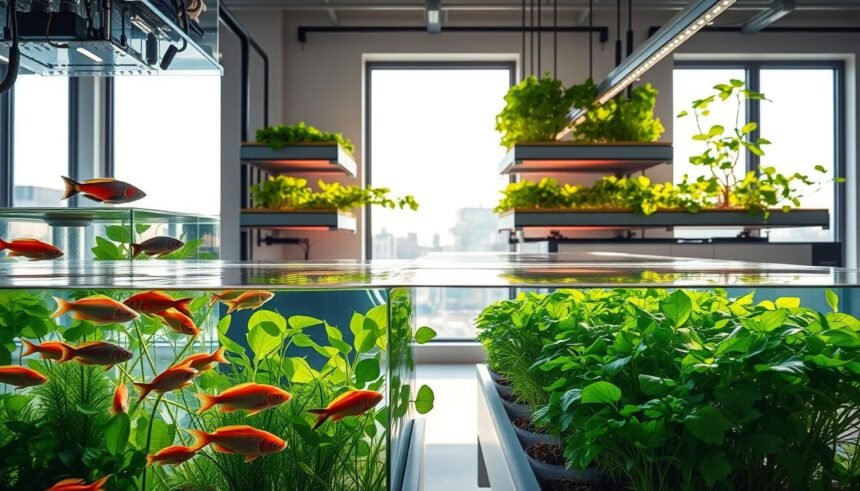Innovation in sustainable food production is at the forefront of Shelby Smallwood’s endeavors as Co-founder and Director of Design/Innovation at Symbiotic Aquaponic. With a background in fabrication and building, Shelby has been developing and testing aquaponics system designs since 2012.
His mechanical abilities and attention to detail have been instrumental in creating effective, sustainable food production systems. As a pioneer in the field, Shelby’s work has contributed significantly to advancing aquaponics technology and making it accessible across the United States.
Shelby’s connection to nature and his Native American heritage have shaped his professional path and the development of Symbiotic Aquaponic, reflecting his commitment to sustainability and environmental stewardship.
Key Takeaways
- Shelby Smallwood is a key figure in sustainable agriculture through his role at Symbiotic Aquaponic.
- His background in fabrication and building has been crucial in developing aquaponics systems.
- Shelby’s work has advanced aquaponics technology, making it more accessible.
- His Native American heritage influences his approach to sustainability.
- Shelby’s contributions have made a significant impact on sustainable food production.
Early Life and Path to Aquaponics
With a natural inclination towards mechanical systems and sustainability, Shelby Smallwood’s early life was a precursor to his work in aquaponics. His journey as an innovator began with an innate mechanical ability, allowing him to approach complex problems with a unique perspective and practical solutions.
Childhood and Educational Background
Growing Up in Oklahoma
Shelby’s early years were spent in Oklahoma, where he developed a curiosity about the natural world. This curiosity would later become the foundation for his work in sustainable farming methods.
Colorado Mountain College Experience
During his time at Colorado Mountain College, Shelby further developed his knowledge of mechanical systems and gained hands-on experience that would be instrumental in his future aquaponics endeavors.
The Genesis of a Builder and Innovator
Natural Mechanical Abilities
Shelby’s natural talent for understanding mechanical systems has been instrumental in developing effective aquaponics designs that balance technical efficiency with biological needs.
Connection to Nature and Sustainability
His passion for sustainability stems from a deep appreciation for natural cycles and a desire to create food production systems that work in harmony with the environment. Shelby’s connection to nature extends beyond his professional work, as he maintains personal interests in horticulture, fishing, gardening, and beekeeping.
Shelby’s approach to innovation is characterized by his meticulous attention to detail and commitment to quality, ensuring that his systems function optimally and sustainably. Since 2012, he has been actively developing and testing aquaponics system designs, refining his approach through hands-on experimentation and practical application.
Shelby Smallwood – Co-founder – Symbiotic Aquaponic
Shelby Smallwood’s journey as co-founder of Symbiotic Aquaponic is a testament to innovative thinking and collaborative leadership. As the driving force behind the company’s technical and design aspects, Shelby has been instrumental in shaping the future of aquaponics.
Founding Symbiotic Aquaponic with Brother Kaben
The foundation of Symbiotic Aquaponic was laid by Shelby and his brother Kaben, showcasing a blend of familial bonding and professional synergy. Their journey began with humble resources in Kiowa, Oklahoma.
Starting with Limited Resources in Kiowa, Oklahoma
With limited resources, the Smallwood brothers embarked on their entrepreneurial venture, demonstrating resilience and determination. Their early efforts were marked by hands-on experimentation and a willingness to learn.
Receiving the Yoshiyama Young Entrepreneurs Award
Their hard work and innovative approach were recognized when they received the prestigious Yoshiyama Young Entrepreneurs Award. This accolade not only validated their efforts but also provided a catalyst for further growth and development.
Shelby’s Unique Role in the Company
As Director of Design and Innovation, Shelby Smallwood brings a unique blend of technical expertise and practical problem-solving skills to Symbiotic Aquaponic. His role is multifaceted, encompassing the design, testing, and refinement of aquaponics systems.
- Shelby’s attention to detail ensures that the company’s aquaponics systems meet high standards of efficiency and sustainability.
- His comprehensive understanding of the science behind aquaponics enables him to troubleshoot complex issues and develop innovative solutions.
- As a hands-on implementer, Shelby is often involved in the physical construction and maintenance of systems, underscoring his commitment to practical functionality.
Director of Design and Innovation
In his capacity as Director of Design and Innovation, Shelby oversees the conceptualization and development of Symbiotic Aquaponic’s systems. His focus on innovation and design has been pivotal in establishing the company’s reputation for quality and reliability.
Technical Expertise and System Development
Shelby’s technical expertise is a cornerstone of Symbiotic Aquaponic’s success. He is adept at handling all technical aspects of aquaponics, from grow media selection to system maintenance protocols, ensuring that the company’s systems are both theoretically sound and practically functional.
Revolutionizing Sustainable Agriculture Through Aquaponics
Through the lens of aquaponics, Symbiotic Aquaponic is reimagining the future of sustainable agriculture. By combining innovative technology with ecological practices, they are setting a new standard for food production. Aquaponics, a system that integrates conventional aquaculture with hydroponics, offers a sustainable and efficient method for growing both fish and crops together in a symbiotic environment.
The Science Behind Symbiotic Aquaponic Systems
The science behind Symbiotic Aquaponic’s systems is rooted in creating a closed-loop ecosystem where fish and plants coexist and thrive together. This method not only conserves water but also eliminates the need for chemical fertilizers.
How Aquaponics Works
Aquaponics works by utilizing the waste produced by fish as a nutrient-rich fertilizer for plants grown hydroponically. This natural process cleans the water for the fish, creating a mutually beneficial environment. The result is a sustainable system that produces both protein and produce.
Environmental Benefits and Sustainability
The environmental benefits of aquaponics are significant. By recirculating water and minimizing waste, aquaponics systems reduce the environmental impact associated with traditional farming methods. This approach to farming is not only sustainable but also helps in reducing carbon footprint.

Impact on Communities and Food Systems
Symbiotic Aquaponic’s work extends beyond just innovative farming techniques; it has a profound impact on communities and food systems. By partnering with schools, non-profits, and tribal groups, they promote sustainable agriculture and support food sovereignty initiatives.
Partnerships with Schools and Tribal Groups
These partnerships are crucial in introducing students and community members to sustainable agriculture principles. For instance, Symbiotic Aquaponic collaborates with schools to provide hands-on learning opportunities, connecting science education with practical food production.
Addressing Food Sovereignty in Indigenous Communities
In indigenous communities, Symbiotic Aquaponic’s systems help address diet-related health issues by increasing access to fresh, nutritious foods. This initiative supports food sovereignty by empowering communities to regain control over their food systems.
| Community | Project | Impact |
|---|---|---|
| Indigenous Communities | Food Sovereignty Initiatives | Increased access to nutritious food |
| Schools | Sustainable Agriculture Education | Hands-on learning opportunities |
| Tribal Groups | Aquaponics Systems Installation | Improved food security |
Conclusion: Shelby Smallwood’s Ongoing Legacy and Vision
With a passion for sustainability, Shelby Smallwood is transforming the way communities approach food production. As the co-founder of Symbiotic Aquaponic, his work extends far beyond designing innovative aquaponics systems; it’s about empowering individuals, families, and communities through sustainable agriculture practices.
The vision that drives Symbiotic Aquaponic today remains consistent with its founding principles: building healthier communities through smart and sustainable aquaponic agriculture that minimizes waste and maximizes food production. Shelby’s technical expertise, combined with his passion for sustainability, has positioned him as a respected figure in the sustainable agriculture industry.
Through ongoing research and development, Shelby continues to refine aquaponics technology, improving system efficiency, reducing equipment costs, and enhancing the quality and variety of food that can be produced. As climate change and food security concerns intensify globally, Shelby’s innovations in water-efficient and space-efficient food production systems become increasingly relevant and necessary.
The legacy Shelby is building today will continue to grow as more communities, schools, and families adopt aquaponics as a solution to both environmental and health challenges, creating a more sustainable and equitable food system for future generations.
FAQ
What is aquaponics and how does it work?
Aquaponics is a sustainable agriculture method that combines raising fish and growing plants in a recirculating system. The fish produce waste that is converted into nutrients for the plants, while the plants help purify the water for the fish.
What are the benefits of using aquaponic systems?
Aquaponic systems offer several benefits, including water conservation, increased crop yields, and reduced land use. They also provide a year-round growing season and can be used in a variety of settings, from small backyard systems to large commercial farms.
How do aquaponic systems impact local communities and food systems?
Aquaponic systems can have a positive impact on local communities by providing fresh, locally grown produce and creating economic opportunities for farmers and other industry professionals. They can also help to improve public health by increasing access to nutritious food.
What kind of equipment is needed to set up an aquaponic system?
The equipment needed to set up an aquaponic system can vary depending on the size and complexity of the system. Common components include fish tanks, pumps, biofilters, and grow beds. It’s also important to have a good understanding of system design and water quality management.
Are there any educational resources available for those interested in learning more about aquaponics?
Yes, there are many educational resources available, including online courses, workshops, and conferences. Many organizations, such as universities and non-profits, also offer training and resources for individuals and communities looking to start their own aquaponic systems.






